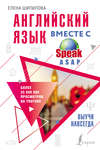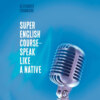Loe raamatut: «A Fantastic English Course. Change your mind, change your English, change your life», lehekülg 2
The mini-story
Hi! This is Alex. Welcome to the mini-story for “What does it take to be an English Learner?” You know what I am going to do, right? Yes, I’m going to ask the story. I want you to answer the questions fast and automatically. I want you to train your brain, teach your brain to answer very quickly. I don’t want you to translate from your language to English or from English to your language. Of course, you can answer with one or two words. It’s okay. Short answers are fine. Let’s go!
Joan is an amazing, intelligent and wonderful woman. She wants to become a freediver. But she cannot. Why? She is a woman with Megalohydrothalassophobia.
Megalohydro what? What is it?
Megalohydrothalassophobia is a fear, a phobia of water and large underwater creatures and objects.
Does Joan have a fear of a fear of deep water and large underwater creatures and objects?
Yes, exactly. She has a fear of deep water and large underwater creatures and objects.
What kind of phobia does Joan have?
Megalohydrothalassophobia. She is a woman with Megalohydrothalassophobia.
She has a phobia, a fear of deep waters like seas, oceans.
Is Joan afraid of large underwater creatures, underwater monsters?
Yes, she is. She is afraid of large underwater creatures such as: whales, sharks, see monsters.
How does Joan feel when she is in the deep waters?
She literally feels very much uncomfortable in the deep waters near huge underwater creatures. It is a huge challenge for Joan.
Is it a difficult task for Joan to dive into the deep waters?
Yes, it is. It is a very difficult task for Joan to dive into the deep waters. It is literally a huge challenge for her.
Why is freediving a huge challenge for Joan?
Because she is a woman with megalohydrothalassophobia.
Oh, I love this word. It is so beautiful, isn’t it? Megalohydrothalassophobia. I love it.
Okay, let’s get back to the story.
Tell me what Joan wants to become?
She wants to become a freediver. She wants to swim as deep as she can underwater without using breathing equipment.
Without using what?
Without using breathing equipment. It is things like an oxygen tank or a scuba tank. She wants to swim as deep as she can underwater without using breathing equipment. But she cannot because of her megalohydrothalassophobia.
What does Joan do about the problem?
She decides to go a local diving school. The diving instructor says, "To get rid of megalohydrothalassophobia you have to dive with a gun. And if you see any underwater monster you have to shoot underwater monsters." Joan goes and buys a gun. She dives with the gun but there is another problem. The gun doesn’t work underwater. Joan quits the school. She feels upset. She is still a woman with megalhydrothalassophobia.
Does the diving instructor help Joan to become a freediver?
No, he doesn’t. The diving instructor doesn’t help Joan to become a freediver.
Does Joan still have that phobia, that fear of deep water and sea monsters?
Yes, she does. She still has that phobia, that fear of deep waters and sea monsters.
She is still the woman with megalhydrothalassophobia.
Why? Why doesn’t he help Joan?
Because the diving instructor is not a good diving instructor. He is a terrible diving instructor.
What does Joan do next?
Joan quits the school. She stops going to the diving school. She feels upset.
Why does she feel upset?
Because she is still a woman with megalohydrothalassophobia. She still has that fear of deep waters and sea monsters.
But one day at a party Joan meets a man. The man is so handsome that she literally cannot take her eyes off him. Through her friends Joan learns that the man’s name is Bob. And that Bob is a professional freediver. She wants to know him better and she wants to learn the secret of his success.
Interesting! Is the man handsome or ugly?
Handsome. He is very handsome. He is so handsome that Joan literally cannot take her eyes off him.
You mean, he is so handsome that Joan cannot not look at him?
Yes, that’s what I mean. Joan cannot not look at him. She cannot take off her eyes off him, because the man is very handsome.
How does Joan learn the man’s name?
Through her friends. Her friends tell Joan his name. Joan learns the man’s name from her friends.
What is the man’s name?
Bob. His name is Bob.
What else does Joan learn about Bob?
She learns that Bob is famous marathon runner.
I see. No wonder why Joan cannot take her eyes off Bob. He is strong and handsome.
What does Joan want to know from him?
She wants to learn the secret of his success.
Does Bob share the secret of his success?
Yes, he does.
Why?
Because Bob cannot not look at Joan either.
Of course, he cannot not look at her. Joan is an amazing woman.
What exactly does Bob say?
He says that becoming a freediver is not an easy process. It literally can take years to become a big runner. And it is important to take it as adventure.
He also says that there are forces that pull you to left and right, but you have to stay on your course. Than and only that success will come to you. You will become what you want to become.
Wow! Bob is absolutely right!
What does Joan learn from Bob?
She learns that freediving is an interesting and exciting adventure.
What else? What else does Joan learn about becoming a freediver?
Joan learns that there are forces that are going to pull her left and right, but she has to stay on her course.
Does Johan stay on her course or does she have to change her direction?
She has to stay on her course. She has to be strong and doesn’t let any forces pull her left and right.
Does Joan listen to Bob?
Yes, of course. Joan listens to him. Joan takes freediving as an adventure. She imagines herself diving deep down without an oxygen tank. She practices freediving every single day. Underwater monsters try to pull her to left and right. Large whales meet her, huge and dangerous shark try to attack her, but Joan continues to dive. She stays on her course. She feels proud of herself.
Does Joan see herself diving deep into the water without an oxygen tank?
Yes, she does. She sees herself diving deep down into the water without an oxygen tank.
Does Joan practice freediving every single day?
Yes, she does. Joan practices freediving every single day.
Who pulls her to left and right?
Underwater monsters do. They pull her left and right.
They want to stop Joan from becoming a freediver?
Yes, they want. They pull her left and right. They want to stop Joan from becoming a freediver.
Does Joan give up? Does Joan quit? Does Joan stop freediving?
No, not Joan. She doesn’t give up. She doesn’t quit. She doesn’t stop. Joan continues to practice freediving every single day.
How does Joan feel herself?
She feels proud of herself. Joan prepares herself to become a freediver.
Does Joan become a professional freediver?
Yes, she does. Joan does become a professional freediver.
After 5 years Joan stops having a fear of deep waters and underwater monsters. Joan becomes a confident, experienced, professional freediver. Now she is a woman without megalohydrothalassophobia.
Joan understands that good things take: a long time, a huge commitment and they are difficult. But they are always worth doing.
How long does it take Joan to become a professional freediver?
5 years. It takes Joan 5 years to become a confident, experienced and professional freediver.
Is Joan still a woman with megalohydrothalassophobia?
No, she is not. After 5 year Joan is still a woman, yes. She doesn’t change physically, not. She is still a woman. But she is a different woman. She is a woman without megalohydrothalassophobia. Joan is a freediver.
This is the end of the mini-story for “What does it take to be an English Learner”. You know what to do, right? Stay on your course and don’t let different forces pull you to left and right. Listen and answer the questions. Feel confident and be proud of yourself when you speak English. This is the best way to start speaking English the way you never did before. Okay, I’ll see you next time. Bye-bye!
My Comments
Hi, this is Alex again and welcome to my comments on the unit called “What does it take to be an English Learner?”
In this lesson I am going to say just a few sentences or maybe more in order to support the message given in the main talk. I am also going to talk briefly about the story, a very very short summery of the story. And I am going to philosophize just quickly say a few sentences giving you my own ideas and I am going to offer other people’s ideas that can help you understand the topic far better. And of course, I am going to focus on the moral of the story. In other words, what the story can teach us to improve not only as an English speaker but also as a human being. My hope is that all this will help you get the main idea of the topic and the message that the story carries and of course, you will listen to English more, you will learn more and you will enjoy it more. Here we go.
First, let’s focus on the main talk and the idea it carries. From the main talk we have learned about the difficulties that a language leaner may have when he or she decides to take up a foreign language. I mean when a language learner decides to start learning and practicing a foreign language. We’ve also begun to understand better that it takes a huge effort to start speaking a foreign language and it literally can take years. Many language learners take the learning process of a new language too seriously and they literally forget that it should be a game and they should take it as an adventure not as something that is comfortable, safe, secure and easy to do. Simply because it is never easy to do a new thing. It is always risky, right? And you have to be prepared for that.
When a language learner or any learner, in fact, begins to realize that it is a risky activity, a dangerous journey and he or she agrees to play this risky game, immediately the forces appear that are trying to pull him or her to left or right to stop the learner from getting what he or she wants to get. In our case, it is the desire to learn something new, interesting and useful, not only for himself or herself, but also for other people.
But by staying on the course, by remaining committed to learning the language he or she demonstrates faith and faith is simply another word for persistence or belief. I would call it discipline. By becoming a big believer, by being an optimist you design your bright future. Although, you can never guarantee the final result, you believe that tomorrow will take care of itself and you will certainly succeed.
Okay, now let’s focus on the story and message it has to offer.
From the story we know that Joan is a woman with megalohydrothalassophobia. Although, you already know what it means and you have learned how to pronounce it correctly and accurately, let me explain it to you again. I believe that it doesn’t hurt to go over it again, right?
Megalohydrothalassophobia is a term that combines several Greek roots to describe a specific phobia. To understand it better let’s break the word and see what we have:
Number 1. Megalo. Megalo means “great” or “large”
Number 2 Hydro. Hydro means “water”
Number 3 Thalasso. Thalasso means “sea” or “ocean.”
Number 4 Phobia. Phobia means “fear”.
Now combining these roots. I mean putting them together we have the word Megalohydrothalassophobia
Megalohydrothalassophobia can be understood as the fear or phobia of large bodies of water, such as oceans, seas, or deep bodies of water. People with megalohydrothalassophobia may experience intense anxiety, intense worry or panic when confronted, when faced with depth of bodies of water and sea monsters.
Getting back to the story we see how strong Joan is. Although, she has a terrible phobia, she still wants to become a freediver. She goes through difficulties. She fails when she decides to learn diving at the local diving school, but still Joan looks at the bright side of her life. One fine day she meets a man who tells her how to succeed in becoming a big freediver by setting his own example. The man shows Joan what she should do in order to become what she wants to become. Just because Joan listens to him and decides to firmly stay on her course. She doesn’t let the forces to pull her to left and right, she becomes a professional, experienced and confident freediver.
As you remember that after 5 year Joan is still a woman. She doesn’t change physically, no, no, no. She is still a woman. But now she is a different woman. Joan has a different mindset. Joan meets difficulties, but because she remains on her course, she remains committed to free diving she becomes a confident, a confident, experienced, professional freediver. She is a woman without megalohydrothalassophobia. Joan is a freediver. Joan succeeds in freediving because she understands that good things take: a long time, a huge commitment and they are difficult. But they are always worth doing.
I would like to finish today’s lesson with just a few more couple sentences to make the point clearer.
As you may understand Joan is you and Bob is me. You are pretty lucky, I should say, because you have found me and now you have a fantastic English learner to learn from, imitate or even emulate which actually means to copy or imitate. There is nothing wrong in imitation. If the person you are imitating is the worthy example. Why not imitate him? And I am lucky as well, because all my huge effort, time and energy and my burning desire to help you become a better English learner, a better English speaker and finally a better human being are not in vain, which means they are not unsuccessful, not useless. And by practicing your English every single, by following the formula, by taking the learning process as an adventure, you begin to understand that good things take a long time, a huge commitment and they are difficult, but they are always worth doing. If you take the process of learning as an adventure, I promise you will get the results you are expecting to have. You will become what you want to become: a fantastic, brilliant and great English speaker.
That’s it for now. See you next time and have a wonderful day!
Unit 2. “Grammar is a myth”
Hi there! This is Alex and this is our second lesson of our fantastic, wonderful and useful English course called “Change You Mind, Change Your English, Change Your Life”. Let’s begin.
In this lesson I am going to talk about Grammar: why we learn Grammar in schools, how we do it and what problems we usually face with and what results we have in trying to acquire a foreign language. And as you already know you can listen and read this lesson here or you can go to my YouTube channel and watch it there. By the way, here is the QR code that you can scan with your phone’s camera and watch it. It’s up to you to decide.
But if I were you would do both. I would watch the video and then I would read and I would listen to it.

So, let’s begin.
Hi, I am Alexander Chumakov: writer, teacher and speaker. I am also the author of Super English course – learn to speak English like a native. Welcome to another edition of my little EasyEnglish Show: where I teach you, I train you and I help you speak English easily, confidently and powerfully.
Today I am going to talk about one of the most burning, the most important and the most dramatic issues that every English learner faces with. It is Grammar. Let’s jump into the topic.
Grammar seems to be the most difficult, the most complicated and the most boring part in language acquisition.
Why?
Because of the way you have been taught English in schools. They make you believe that English grammar is a kind of marvelous box with a secret inside.
They often tell you, “If you want to know English Grammar, if you want to reveal the secret of the grammar box, one of the obvious ways to perceive it is to take it into pieces.”
Everybody knows that if you want to know how something is made, you unscrew the parts and you see that the secret is inside the box. (I call this box Pandora’s box).
And you listen to them and you (blindly) open that so-called – the box of grammar rules – Pandora’s box. Hoping that this is only way to boost up your speed of learning and speaking English.
But when you open it, you unscrew the box; suddenly it becomes even worse, because now you have no idea how to put all the parts together, when you want to make your own sentence. And eventually, it slows down your speaking a lot.
You try very hard many times, but you fail over and over and over again. Eventually, you become a Grammar agnostic. You come to the realization that grammar is just a myth; it is something that is untrue, something that is better left unsolved. You close Pandora’s box.
And what you do next? You simply start to listen to people a lot and you start to repeat what they say. In other words, you start learning English with your ears like children do.
With time it becomes easier and easier for you to figure out what you hear, and eventually you start to speak English without thinking about grammar rules like native speakers do.
I wish you good luck and every success. See you soon!
Okay, this is the end of this lesson for “Grammar is a myth” I mean you have watched the video or you have listened to it as a podcast. Now I am sure that you have a better understanding what I actually mean when I say that Grammar is a myth. But if you still have some difficulties understanding some words, don’t worry. I’ll explain them to you in the vocabulary lesson. Of course, you may agree with the ideas given here or you may disagree with them, it is your choice. But let’s not talk about it here. Let’s talk about it in the part of this set of lessons called “My Comments”, where I am going to philosophize about it. Okay. Watch this video as many times as you want to share it with your friends and help to learn they way how to learn Grammar better. That’s it for today.
Have a great day and see you soon.
The vocabulary lesson
Hello! This is Alex. Welcome to the vocabulary lesson for “Grammar is a myth” Let’s start right away.
Our first word for today is issue. You can see this word in one of my opening sentences and it says: “Today I am going to talk about one of the most burning, the most important and the most dramatic issues that every English learner faces with.”
Okay, issue has a few meanings in English, but here issue means a topic of interest or discussion. So in the presentation I say that I am going to talk about one of the most burning which means crucial or very important topics or problem that every English learner faces with. Well, actually, not only every English leaner faces this problem, but also every language learner does face the same problem. When I say a language learner I am definitely talking about a person who learns a foreign language. So now you understand that issue means a topic of interest or a topic of discussion.
Next we have a phrase language acquisition. In this article I say, “Grammar seems to be the most difficult, the most complicated and the most boring part in language acquisition.” Language acquisition is a situation when you listen to the language or when you read in the language and you understand it. Another way to put it is that language acquisition is when you begin to get the language, and because you understand what you hear or read you begin to use it successfully. “You can only acquire the language when you understand the message,” as Steven Krashen, one of the best experts on language acquisition, likes to say.
Okay, another phrase in this presentation is a kind of.
I say, “They make you believe that English grammar is a kind of marvelous box with a secret inside.”
(A) kind of means something like this or that. So they (teachers, educators) want you to believe that English grammar is something like a marvelous, very beautiful, very amazing box with a secret inside. So again, (a) kind of means something like this, but it is not exactly this or that. It may look like this or that, but it is not exactly this or that. They make you believe that English grammar is a kind of marvelous box with a secret inside. It is a box, right! But it is not one hundred percent the same box. I think you get the idea, right!?
Next we have the phrase reveal the secret. For those who did my Unique English Course, which is, by the way, the bestselling book, it is not a new phrase, right? But if you didn’t do this course, don’t worry. I’ll explain it to you right now. The sentences says, “They often tell you, “If you want to know English Grammar, if you want to reveal the secret of the grammar box, one of the obvious ways to perceive it is to take it into pieces”.
Oh, here are some more wonderful words in this marvelous sentence. Okay, I’ll explain them to you, just in a minute, but now let’s focus on the phrase to reveal the secret. To reveal a secret simply means to tell or to show a secret or to make known or public. So they often tell you, “If you want to know English Grammar, if you want to make known or disclose, or to show the secret of the grammar box, one of the obvious ways to perceive it is to take it into pieces.” To perceive simply means to realize or to see something that you didn’t see before. And the phrase to take something into pieces means to break something down into parts or to separate something into smaller parts.
So let’s put it all together and see what we have here.
They often tell you, “If you want to know English Grammar, if you want to reveal the secret of the grammar box, to disclose the secret, one of the obvious ways, one of the natural ways to perceive, to realize it is to separate grammar into smaller parts to take it into pieces”. It is a long sentence, but we did it.
Okay, we move on and we see the word unscrew.
The sentence says, “Everybody knows that if you want to know how something is made, you unscrew the parts and you see that the secret is inside the box.” It is very easy to understand what it means, right? But anyway, let me talk just a little bit about it. Unscrew means to remove a screw from an object. In our case, it is from the box. It has the same meaning like separate something by removing a screw. So the sentence says that if you want to know how something is made, you remove a screw or screws from the box. You separate the box into smaller parts and then you begin to see what the box has inside. You unscrew the parts and you see that the secret is inside the box. But you can only reveal the secret, you can only see the secret, if you unscrew the parts of the box.
Another phrase in this presentation is to boost up.
I say, “Hoping that this is the only way to boost up your speed of learning and speaking English.” This is one of my favourite phrases in English. Why? Because to boost up means to increase or to improve or to make something better. By the way, one of my English courses is called “Boost up your English”. Okay, getting back to this sentence. So they (the teachers) do it hoping that this is the only way to increase, to improve your speed of learning, to boost up your speed of learning and speaking English by unscrewing the parts of the Grammar Box by separating the parts of the box.
Our next word is agnostic.
You can see it in sentence like “Eventually, you become a Grammar agnostic.”
Agnostic is someone who does not know or does not have an opinion about whether something is true, good or correct. Or simply to say, agnostic is a person who openly says, “I am not good at this or I don’t know this. I am agnostic.” In our case, a student can become a Grammar agnostic because he doesn’t understand grammar well or he is not good at grammar. He becomes a Grammar agnostic. He stops believing in Grammar.
Alright and then another phrase is slow down
I say, “But when you open it, you unscrew the box, suddenly it becomes even worse, because now you have no idea how to put all the parts together, when you want to make your own sentence. And eventually, it slows down your speaking a lot.”
To slow down means to move or to go more slowly or to become slow or slower. When you open that so-called Pandora’s box, you realize that everything becomes even worse, because there are so many things there and you don’t know how to put all of them together when making your own sentences in English. As a result, you go slowly, you begin to speak slowly. You speak English slowly because you can’t decide what to do with all these parts. It slows down your speaking a lot.
Next we have the phrase to leave unsolved.
I say “You come to the realization which means you begin to understand that grammar is just a myth. It is something that is untrue, something that is better left unsolved. You close Pandora’s box.”
To leave something unsolved means the problem you have cannot be solved and it is better not to know the mystery or solution, or the truth about it. So you decide to walk away or not to deal with the problem anymore, because it is impossible to find the solution to the problem. So you come to the realization, you begin to understand that grammar is just a myth which you cannot solve and you decide to leave it unsolved by closing so-called Pandora’s box. Yes, sometimes it is better not to know the mystery, right?
Our final phrase for today is to figure out.
I say, “With time it becomes easier and easier for you to figure out what you hear and eventually you start to speak English without thinking about grammar rules like native speakers do.”
To figure out is simply another way to say to understand. With time it becomes easier and easier for you to understand what you hear and eventually, finally you start to speak without thinking about grammar rules like native speakers do.
You figure it out! You figure out what you hear. You acquire the language. You begin to speak the language.
Alright, that is all for the vocabulary lesson for “Grammar is a myth. See you at the mini-story”.
Tasuta katkend on lõppenud.

















